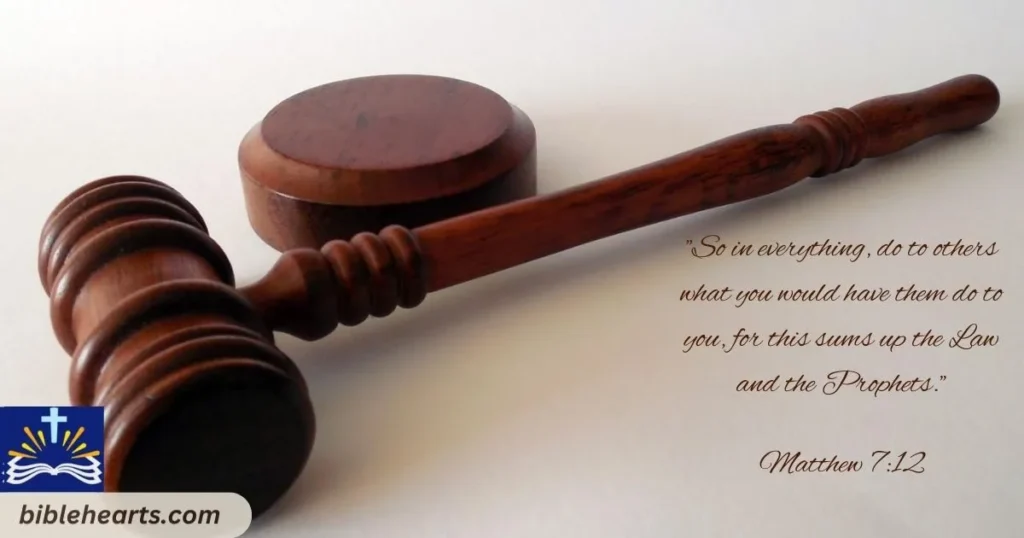“What you sow, you will reap; divine justice ensures fairness in every circumstance.”
The concept of karma and divine justice has been a topic of reflection and discussion for centuries. Both ideas point to the universal truth that one’s actions and intentions carry consequences—whether positive or negative. In Christianity, the Bible shares numerous verses that align with the concept of “you reap what you sow,” emphasizing how God’s justice works in the world. These verses offer not just wisdom, but also comfort, as they assure us that every deed—whether good or bad—will be judged fairly.
Understanding these teachings can help us navigate life with more intention, knowing that our choices impact not only our lives but also those around us. The Bible stresses that God’s justice is rooted in love, fairness, and righteousness, offering us clarity about how He addresses the consequences of our actions.
Through exploring these verses, readers can gain valuable insights into divine justice and how it is applied to their lives. This understanding brings hope, accountability, and a deeper appreciation for God’s perfect and impartial justice.
Top Bible Verses About Karma and Divine Justice Explained
Galatians 6:7
“Do not be deceived: God is not mocked. A man reaps what he sows.”
This verse directly mirrors the idea of karma, suggesting that people will face the consequences of their actions. God’s justice ensures that no one escapes the repercussions of their behavior. If you sow kindness, you will reap blessings; if you sow hatred, you will face judgment.
Proverbs 11:18
“The wicked man does deceptive work, but he who sows righteousness will have a sure reward.”
This verse highlights the principle of reaping rewards based on the nature of one’s actions. Those who live righteously will receive God’s blessings, while those who engage in deceitful or wicked acts will ultimately face consequences.
Proverbs 26:27
“Whoever digs a pit will fall into it; if someone rolls a stone, it will roll back on them.”
This verse reflects the idea that negative actions will eventually come back to affect the one who initiated them. It serves as a warning to avoid causing harm to others, as it may eventually harm you instead.
Matthew 7:12

“So in everything, do to others what you would have them do to you, for this sums up the Law and the Prophets.”
The principle of treating others as you wish to be treated aligns with the concept of karma. This Golden Rule teaches that our actions towards others—whether kind or unkind—will reflect back upon us.
Proverbs 22:8
“Whoever sows injustice reaps calamity, and the rod they wield in fury will be broken.”
This verse reinforces the idea that unjust actions lead to disaster. Those who sow injustice will experience trouble, and the power they wield through cruelty will ultimately be destroyed.
Romans 2:6
“God will repay each person according to what they have done.”
Divine justice is impartial. God will repay individuals based on their actions, underscoring the fairness of His judgment. This verse reminds us that no action, good or bad, goes unnoticed by God.
Job 4:8
“As I have observed, those who plow evil and those who sow trouble reap it.”
This verse echoes the Bible’s consistent teaching that harmful actions lead to negative outcomes. It serves as a reminder that evil deeds carry their own inevitable consequences.
Psalm 7:15-16
“Whoever digs a hole and scoops it out falls into the pit they have made. The trouble they cause recoils on them; their violence comes down on their own heads.”
Similar to Proverbs 26:27, this verse emphasizes that those who seek to harm others will ultimately bring harm upon themselves. Divine justice ensures that actions against others will not go unpunished.
Proverbs 14:14
“The faithless will be fully repaid for their ways, and the good rewarded for theirs.”
This verse speaks to the principle of justice. People who live faithlessly or in sin will receive the consequences of their choices, while the faithful and righteous will receive their rewards.
Hosea 10:13
“But you have planted wickedness, you have reaped evil, you have eaten the fruit of deception. Because you have depended on your own strength and on your many warriors.”
Here, Hosea reminds the people that their wickedness will bear bitter fruit. The “karma” of their actions will ultimately lead to their downfall. God’s divine justice does not allow the wicked to escape unscathed.
Matthew 6:14-15
“For if you forgive other people when they sin against you, your heavenly Father will also forgive you. But if you do not forgive others their sins, your Father will not forgive your sins.”
This passage speaks to the consequences of unforgiveness. The principle of sowing and reaping is evident here, as forgiving others leads to receiving forgiveness, while withholding forgiveness brings judgment.
Proverbs 1:31
“They will eat the fruit of their ways and be filled with the fruit of their schemes.”
This verse emphasizes that the consequences of one’s actions are inevitable. The wicked will experience the results of their destructive ways, and the righteous will enjoy the fruits of their good choices. It echoes the idea that what one sows, they will eventually reap, reinforcing the concept of divine justice and karma.
2 Corinthians 9:6
“Remember this: Whoever sows sparingly will also reap sparingly, and whoever sows generously will also reap generously.”
This verse highlights the principle of generosity. In terms of karma, it teaches that the measure of kindness, love, and goodwill you offer to others will come back to you in like measure. The more generous you are in your deeds, the more you will receive in return from God and those around you.
Proverbs 12:14
“From the fruit of their lips people are filled with good things, and the work of their hands brings them reward.”
Here, Proverbs emphasizes the impact of one’s words and actions. This verse suggests that our speech and the labor we put into the world result in either blessings or consequences. It reinforces the idea that every action—spoken or done—has a return, which corresponds to the divine justice we face.
Matthew 25:40
“The King will reply, ‘Truly I tell you, whatever you did for one of the least of these brothers and sisters of mine, you did for me.'”
In this verse, Jesus connects our actions toward others with our relationship with Him. It highlights the importance of serving and loving others, as those deeds are treated as if they are done for Christ Himself. This reflects the biblical truth that what we do to others, we will receive in return from God, reinforcing the principle of divine justice.
James 3:18
“Peacemakers who sow in peace reap a harvest of righteousness.”
James speaks to the positive outcome of those who foster peace. This verse emphasizes that sowing peace leads to a righteous reward, aligning with the concept of karma in the Bible, where positive actions lead to positive results. The divine justice of God ensures that those who work for peace will receive a harvest of righteousness.
Proverbs 3:27
“Do not withhold good from those to whom it is due, when it is in your power to act.”
This verse reminds us to be generous with our good deeds and not to hold back when we are able to help others. It aligns with the biblical principle that we are called to do good and justly treat others. The good we do in the world will return to us through God’s justice.
Isaiah 3:10
“Tell the righteous it will be well with them, for they will enjoy the fruit of their deeds.”
This passage reinforces the idea that the righteous will be rewarded for their good deeds. God’s divine justice assures that the faithful will experience blessings as a result of their actions, aligning closely with the principle of karma.
Bible Verses About Being Unique and God’s Creation
Psalm 37:27-28
“Turn from evil and do good; then you will dwell in the land forever. For the Lord loves the just and will not forsake his faithful ones.”
These verses speak about the reward for turning away from evil and embracing righteousness. It encourages us to act justly and assures us that those who do so will be protected and rewarded by God. The divine justice system is always fair, and those who live righteously will receive their due blessings.
Proverbs 13:21
“Trouble pursues the sinner, but the righteous are rewarded with good things.”
Here, Proverbs contrasts the fate of the sinner and the righteous. Those who live in sin will face trouble and judgment, while those who live justly will receive rewards from God. It reiterates the divine justice of God, ensuring fairness in all outcomes.
Jeremiah 17:10
“I the Lord search the heart and examine the mind, to reward each person according to their conduct, according to what their deeds deserve.”
This verse speaks to the omniscience of God and His ability to judge based on our innermost thoughts and deeds. It emphasizes the divine justice system, where every person will be rewarded or punished based on their actions, ensuring fairness and equity.
Ecclesiastes 12:14
“For God will bring every deed into judgment, including every hidden thing, whether it is good or evil.”
This verse reinforces the idea that God’s justice will ultimately judge all actions, even those that are hidden. It assures us that there is no escaping the consequences of our deeds, and divine justice will prevail, as even the secret things will be brought to light.
1 Peter 3:9
“Do not repay evil with evil or insult with insult. On the contrary, repay evil with blessing, because to this you were called so that you may inherit a blessing.”
In this passage, Peter encourages believers to respond to evil with kindness and blessing, which aligns with the teachings of divine justice. By doing so, we align ourselves with God’s justice and receive His blessings in return.
Psalm 62:12
“And with you, Lord, is unfailing love; and, by you, I will be repaid for my deeds.”
This verse assures us that God will repay us for our deeds, whether good or bad. Divine justice is fair and rewards those who act righteously. It aligns with the principle of sowing and reaping, where we receive consequences according to our actions.
Proverbs 24:12
“If you say, ‘But we knew nothing about this,’ does not he who weighs the heart perceive it? Does not he who guards your life know it? Will he not repay everyone according to what they have done?”
This verse speaks to God’s omniscient nature, assuring us that He knows the truth about all situations, even when we try to hide or deny our actions. He will repay us according to what we have done, reflecting His divine justice.
James 1:12
“Blessed is the one who perseveres under trial because, having stood the test, that person will receive the crown of life that the Lord has promised to those who love him.”
This verse offers encouragement to those who endure trials, promising a reward for perseverance. It aligns with divine justice, assuring us that our perseverance and faithfulness will be rewarded.
Revelation 22:12
“Look, I am coming soon! My reward is with me, and I will give to each person according to what they have done.”
In this passage, Jesus promises to return and bring justice, rewarding each person based on their actions. It reflects the divine justice system, where individuals are judged based on their deeds.
Romans 12:19
“Do not take revenge, my dear friends, but leave room for God’s wrath, for it is written: ‘It is mine to avenge; I will repay,’ says the Lord.”
This verse assures us that vengeance belongs to God, not to us. It encourages us to trust in God’s divine justice and leave judgment to Him, knowing that He will repay each person according to their deeds.
Luke 6:38
“Give, and it will be given to you. A good measure, pressed down, shaken together and running over, will be poured into your lap. For with the measure you use, it will be measured to you.”
Here, Jesus teaches the principle of generosity and reciprocity. The more generous we are, the more we will receive, illustrating the concept of sowing and reaping. This reflects karma and divine justice—our actions towards others will come back to us.
Isaiah 59:18

“According to what they have done, so will he repay wrath to his enemies and retribution to his foes; he will repay the islands their due.”
This verse emphasizes the justice of God, where He repays each person according to their actions. It underscores the fairness of God’s judgment and the consequences of evil deeds.
Colossians 3:25
“Anyone who does wrong will be repaid for their wrongs, and there is no favoritism.”
This verse assures us that God will repay wrongdoers for their actions. It reflects the impartial nature of divine justice, ensuring fairness for all.
Psalm 34:21
“The wicked will slay the wicked; the foes of the righteous will be condemned.”
This passage reassures us that the wicked will not escape God’s judgment. Those who oppose the righteous will face the consequences of their actions.
Proverbs 21:13
“Whoever shuts their ears to the cry of the people with low-income will also cry out and not be answered.”
This verse emphasizes that our treatment of others, especially the people with low-income and needy, will determine how we are treated in return. Divine justice ensures that those who ignore the cries of others will experience the same fate.
Romans 14:12
“So then, each of us will give an account of ourselves to God.”
This verse reminds us that we will all be judged by God based on our actions. Each person must account for what they have done, reinforcing the concept of divine justice.
What Does the Bible Say About Karma and Divine Justice?
The Bible often touches upon themes similar to the concept of karma, though the term “karma” itself is not used. Instead, the Bible uses language that focuses on reaping what one sows, the rewards of righteous living, and the consequences of sin.
Many of the verses listed below reveal that divine justice operates on the principles of fairness and equity, ensuring that people are held accountable for their actions. Here’s a breakdown of some key Bible verses that elaborate on this divine principle:
Key Insight
1. What is the concept of karma in the Bible?
Karma in the Bible refers to the principle of sowing and reaping, where the actions of individuals determine the outcomes they face, either positive or negative.
2. Does God reward good deeds according to the Bible?
Yes, the Bible assures that God rewards the righteous and those who do good, while the wicked will face consequences for their actions.
3. Can we expect divine justice in all situations?
Yes, divine justice ensures that every action, whether good or bad, will be judged and repaid by God in due time.
4. How does the Bible view revenge and forgiveness?
The Bible teaches us to leave vengeance to God, encouraging forgiveness and trust that He will repay wrongdoers according to their deeds.
5. Does the Bible suggest that our actions affect our relationship with God?
Yes, the Bible emphasizes that our actions directly impact our relationship with God and our reward or judgment, reinforcing the importance of righteous living.
Conclusion:
In conclusion, the Bible provides a profound understanding of karma and divine justice, teaching us that our actions carry significant consequences.If through the principle of sowing and reaping or through God’s righteous judgment, Scripture assures us that we will be rewarded or held accountable for what we do.
The Bible encourages us to live righteously, treat others with kindness, and trust in God’s fairness, knowing that He will repay everyone according to their deeds. By understanding these biblical teachings, we are reminded to live with integrity and compassion, knowing that divine justice will always prevail in the end.

Hi! I’m Ethan Matthews, a tech enthusiast and avid traveler, sharing insights and adventures from my journeys around the globe.










